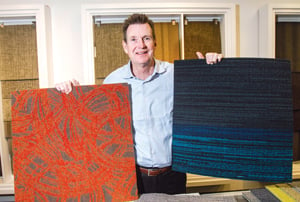
For 36 years, City of Industry’s Bentley Mills Inc. has been crafting 12-foot-wide rolls of the kind of plush, high-end carpet that blankets the floors of corporate board rooms and offices.
But now, separated from a more than 20-year relationship with a Georgia carpet giant, the company is thinking smaller. Its new focus is on carpet tiles: modular squares that represent a fast-growing part of the commercial carpet market.
Owner Dominus Capital, a New York private equity firm that bought Bentley in 2012, has spent $5 million to support that shift, investing in new machines, developing a new website and attracting new leadership. With that commitment, the company has introduced more products recently than it has in years and sales grew more than 10 percent last year, according to the company.
The expansion into carpet tiles couldn’t have happened before Dominus bought Bentley from its former owner, flooring behemoth Interface Inc. of Atlanta. Interface specializes in carpet tiles – its stock trades under the ticker “TILE” – and had only bought Bentley for its old-line broadloom carpet business as a complement.
“(Dominus) saw the growth potential,” said Ralph Grogan, Bentley’s chief executive. “Before, we couldn’t compete in the carpet tile marketplace. We knew if Dominus was willing to invest money into carpet tile, we could certainly grow that business.”
Bentley made some carpet tiles under Interface, but its capacity was limited and the company’s focus was on broadloom carpet, sold in 12-foot-wide rolls. But expanding its carpet tile capabilities is critical for the business, as tiles have been overtaking broadloom carpet, especially for commercial customers.
Carpet tiles are easy to install – they can be put in without removing the furniture from a hotel room or office – and individual tiles can be replaced when stained or damaged. Broadloom carpet, on the other hand, can only be installed in empty rooms and often must be replaced entirely if a single section is damaged.
Lori Peterson, director of interior design for Meis Architects, a firm headquartered jointly in New York and Los Angeles, said those advantages mean property owners and building managers increasingly prefer carpet tiles, making it important for Bentley to expand that side of its business.
“It broadens their market,” said Peterson, who has used Bentley broadloom carpet in some of her projects. “It will open doors for them in that all their competitors use tile, and it will let them enter some markets they haven’t been in.”
New owners, leaders
Interface bought Bentley in 1993 specifically for its broadloom business, renaming the company Bentley Prince Street after merging it with another carpet company in 2002.
In August 2012, Interface sold Bentley to Dominus for $35 million as part of its exit from the broadloom carpet market. While the broadloom business wasn’t hurting, it was growing much more slowly than Interface’s core carpet tile business. In 2011, broadloom carpet sales grew by 4.5 percent from the previous year while carpet tile sales grew 11 percent, according to Interface filings.
Despite the relatively slow growth, Bentley looked good to Dominus, which specializes in buying divisions of larger companies and already owned other carpet companies.
The purchase attracted back several former Bentley executives and carpet industry veterans, including Grogan, Chief Operating Officer Jim Harley and head designer Todd van der Kruik. All three had held leadership roles with other Dominus carpet companies.
“Jim and I had a really good vision, and with Todd van der Kruik, of what Bentley could be like in the future,” Grogan said. “We had all competed against Bentley for years. We had a vision for what Bentley could do to grow.”
New technology
That vision calls for, above all else, expanding Bentley’s capacity for making carpet tiles. Dominus spent $2 million on new carpet tufting machinery, increasing the company’s capacity, and $1 million on renovations to the carpet tile line.
With those machines, Grogan said Bentley can now produce more carpet tiles, with more designs and different types of backing. Last year, Bentley introduced 14 products – mostly different types of carpet tile – giving it nearly 100 products overall, Grogan said. Bentley had been introducing four to five products a year, mostly broadloom offerings, under Interface.
New designs are critical to carpet designers and manufacturers, Grogan said, because customers – mostly architects and designers – are always looking for what’s new.
Along with introducing products and expanding its floor tile offerings, Bentley has also beefed up its sales staff. And in a little more than two years, it’s seen a dramatic shift: Carpet tiles, which once made up just 20 percent of Bentley’s business, now account for half of its sales, Grogan said.
Overall, sales for the company have increased 10 percent in 2014 from the previous year, with much of that from the new carpet tile designs, he said.
“In the total scheme of things, we’re very small in the commercial market,” Grogan said, “which is a good thing for us because there’s plenty of opportunity to grow.”
